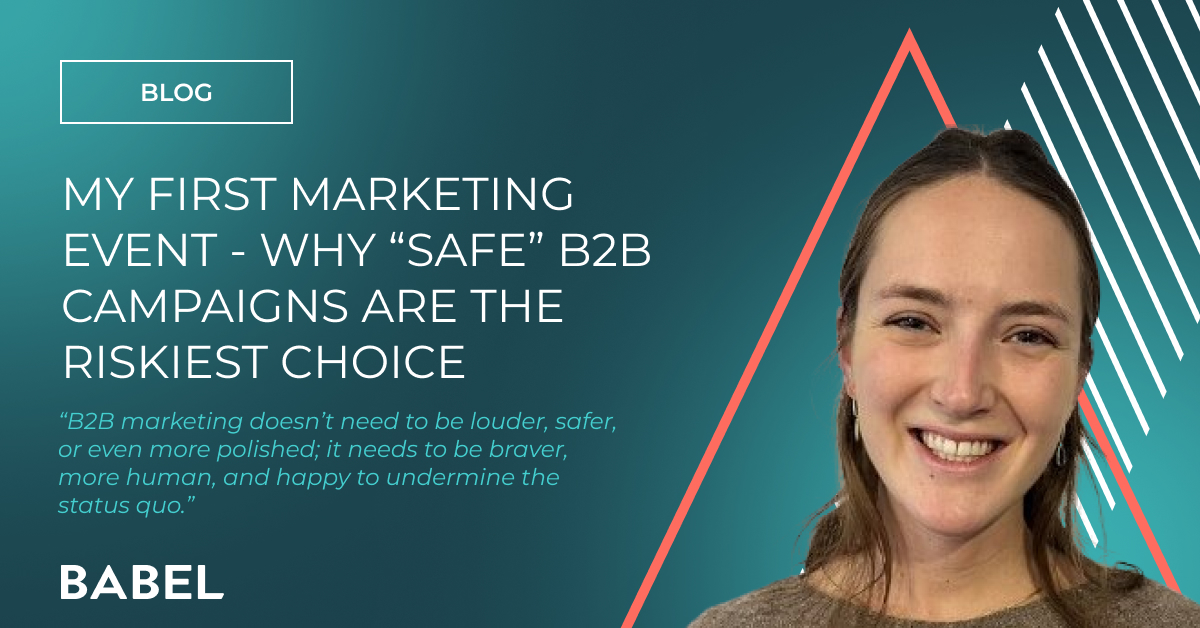Going client-side
In August last year, I was offered an opportunity to take a step away from 'agency life' and put on the hat of an 'in-house' communications manager.
Having been at Babel for nearly 10 years - and without leaving - I was given the chance to go on 'secondment' for six months; a temporary contract to support the external communications and marketing teams at one of Babel's longest-serving clients, BICS. I jumped at the chance: having worked on the BICS team at Babel, what would it be like, 'on the other side'?
Nearly six months later, as the contract approaches its end, I have reflected on my learnings and takeaways.
The distinct differences
I am going to start with the obvious ones. In a PR agency, like Babel, you work for the agency and your clients are external organisations or companies, like BICS. Daily, we juggle the PR and communication needs of multiple clients across various industries, and by the very nature of working with multiple teams, agencies are often fast-paced environments, with tight deadlines and a high volume of work. Because of this, the dynamic nature of our work can be both challenging and exciting. You can take a look at some of the companies we've worked with, here.
As an in-house communications professional, you are employed directly by one company, and your focus is exclusively on the communication needs of that single organisation. Working in-house may offer a more stable and predictable environment, and you can become deeply ingrained in the company's culture and work more closely with internal teams.
The knowledge
Working in an agency exposes you to a diverse range of clients and industries. This variety can be exciting, but it may also mean within a single day you could be talking about the latest developments in 6G standards, followed by a discussion on predictions for the telematics and IoT industries, rounded off nicely with writing up a use-case on soil measurement offsetting carbon usage. I expect you get where I am going with this: whilst the knowledge is there, it will naturally be less in-depth knowledge about one industry.
In-house, you will develop a deep understanding of your company's products and services, as well as get to know the experts with specialised knowledge, the partners and customers the company works with, and their competitors.
Short and long-term strategies
Sometimes, agency work involves project-based assignments, and you may be working on different campaigns or projects for different clients simultaneously. In an in-house role, you are typically more focused on the long-term communication strategy of the company. This involves building and maintaining the organisation's overall reputation and brand and often working with external partners and agencies to achieve your goals.
External vs. internal communications
Agencies primarily deal with external communications, helping clients manage their relationships with the public, media, and stakeholders, via thought leadership activity, a press release pipeline, awards and speaking opportunities, and social media.
In-house communications managers often have a broader scope, dealing not only with external communications but also internal communications, and ensuring the two are aligned. This may include managing communication within the company, such as employee communications and corporate culture, and supporting in-house activity and other teams.
Metrics & measurement
Commonly, PR agencies can be more focused on demonstrating the value of their work through metrics like media coverage, reach, and campaign success. In-house communication managers, however, may place a stronger emphasis on measuring the impact of communication efforts on the overall success and goals of the company. Both agency and in-house roles have their unique advantages and challenges.
As an employee, the choice between the two roles depends on individual preferences, career goals, and the type of work environment that best suits your skills and interests. Some professionals may choose to transition between agency and in-house roles at different points in their careers to gain a well-rounded perspective!
For a company looking for support with its communications strategy, choosing a PR agency can be tough, especially depending on what the in-house communications team makeup looks like - is there one?
At Babel, not only do we have a team made up of communications professionals who have that in-house experience, but we also:
- Aim to be an extension of your own communications team, understanding the benefits of not working as a separate entity.
- Take extra time to learn and understand your company and the industry you are in.
- Offer the flexibility of both long- and short-term strategies, ensuring we are aligned on the company's wider business goals and growth targets.
- Work collaboratively with both external and internal communications teams to ensure we are all pulling in the same direction.
- Offer metrics and measurements that reflect not just the work we are doing, but the wider impact that the achievements have on your company, within its industry - for example, key message penetration within each piece of coverage, and share of voice (SOV) measurement against company's main competitors.
If you would like to speak with us further about how we can best work with you, please do not hesitate toget in touch.



.jpg)

.jpg)

.jpg)
